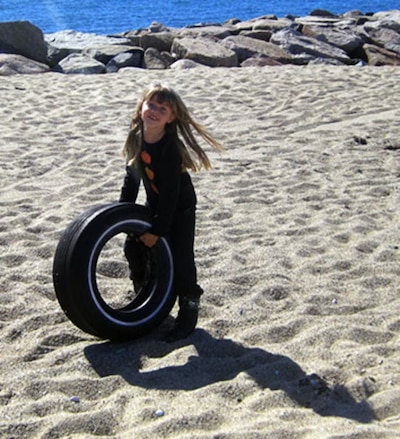Refrigerators, washing machines, charcoal grills, toilet bowls, rubber boots, truck tires, construction debris, milk crates, vinyl siding, and thousands of cigarette butts—these are some of the items found each year during COASTSWEEP, the Massachusetts statewide coastal cleanup cleanup started in 1987. Organized by the Massachusetts Office of Coastal Zone Management (CZM), COASTSWEEP calls to thousands of volunteers each year to come out and clean up the Commonwealth's coast. Please be one of them!
Marine Debris - Impacts and Prevention
Marine debris—or the trash and other discarded materials that end up in the sea or on the shore—is more than an eyesore. Marine life can mistake things like plastic bags, pellets, and balloons for food or become entangled in fishing line, nets, and six-pack holders. Plastic bags can clog boat-engine intakes, causing overheating and expensive repairs, and fishing line can get wrapped around propellers. Broken glass or metal cans can cut barefoot beachgoers. The solution to this pollution is prevention.
- More on Marine Debris - For details on marine debris, its impacts, and how to prevent it, see the COASTSWEEP - More on Marine Debris page.
- Don't Litter! - Litter on the ground becomes litter in our oceans. You can help by placing your trash into proper receptacles. If none are available, take trash home. Never throw cigarette butts, fishing line, or any other garbage into the ocean, onto the ground, or into a storm drain. Take advantage of shoreside recycling containers. For more on stopping litter and other trash prevention programs, see the Keep America Beautiful Programs & Initiatives web page.
- Marine Debris Is Everyone's Problem - The National Oceanic and Atmospheric Administration's Marine Debris Program website provides information on marine debris, including details on plastics in the oceans, ongoing research, and grants opportunities.
- From Land to Sea and More - The U.S. Environmental Protection Agency Trash Free Waters website gives extensive information on marine debris, its sources, and what is being done to address the problem.
Oceans Awash with Debris
Marine debris that does not wash up on shore can collect in certain areas of the world's oceans called gyres—large systems of rotating ocean currents. There are five primary gyres found in the Pacific, Atlantic, and Indian Oceans—and they all are known to accumulate floating debris.
- All 5 Gyres - The 5 Gyres website provides information on these gyres where plastic debris collects in the world's oceans.
- Pacific Garbage Patch - The Great Pacific Garbage Patch web page from National Geographic discusses the Pacific Garbage Patch, the popular name given to the trash that has accumulated in the North Pacific Subtropical Gyre.
- Atlantic Garbage Patch - The Sea Education Association (SEA) has been studying the North Atlantic debris field for the past 25 years. Their Ocean Plastics and Marine Pollution pages describe their work in both the Atlantic and Pacific.
Join a Cleanup
With more than 1,500 miles of Massachusetts shoreline to clean, COASTSWEEP could use your help. See How to Get Involved in COASTSWEEP for details on joining a cleanup as a volunteer or local cleanup coordinator. COASTSWEEP cleanups occur throughout September and October each year and CZM provide the free supplies and support for all those involved.
Global Effort
COASTSWEEP is part of Ocean Conservancy's International Coastal Cleanup (ICC), which is held worldwide each September to raise awareness about marine debris and clean beaches. Through ICC, hundreds of thousands of dedicated volunteers remove trash from beaches, lakes, and streams across the globe. These volunteers collect data on the specific types of debris they find, which allows Ocean Conservancy to help determine the behaviors that cause the debris.
- About the Cleanup - For more information about this effort, see the ICC website.
- Latest Updates - Photos, the most recent cleanup data, and news releases about the ICC are available through Ocean Conservancy's News Room.
